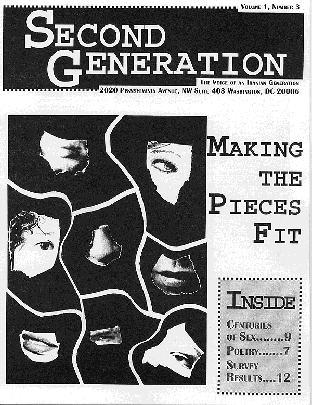![[ How to advertise here ]](Images/Ads/Ad.gif)

![[ How to advertise here ]](Images/Ads/Ad.gif)


Second Generation co-founders Termeh Rassi (right) and Sabi Behzadi
Termeh Rassi is the editor in chief and publisher of Second Generation, a bi-monthly published in Washington D.C. The magazine features a broad range of Iranian topics, namely cultural conflicts felt by the younger generation of Iranians living in the United States. The magazine’s open and honest editorial policy has earned it a considerable following. Rassi wrote this piece for The Iranian:
In the aftermath of the revolution and the great migration, most people focused on the plight of the generation that had to make a new start abroad. They had worked hard, or at least they believed they had, and had labored years to establish themselves.
Suddenly, they found themselves stranded in the hostile world of the West where nobody cared who they were or what they had done, nobody asked if they where the Hosseini's from Shiraz or Isfahan, if they were a general or engineer.
They spent their days fantasizing about what they would do when they went back . . . who they would be . . . how important they would be.
Then there were the children who were too young to remember anything about Iran or those who were born here . . . lamenting the very real possibility that they would never go back. We wondered if they would be able to speak to their grandparents, if they would ever know who Rumi or Khayam or Saadi were.
Frustrated by the names nobody could pronounce, parents they couldn't understand, and a fictitious country that looked like a cat . . . they clenched their teeth, waiting to turn 18.

Then there was us. We didn't believe in labeling, in name-calling, and were really tired of listening to the evil conspiracies responsible for our plight. We were realistic enough to know that we might never go back and tried to convince our parents that economic law dictated that we didn't all have to become doctors or engineers.
We functioned well, had minor accents in either language . . . and felt at home nowhere. We hadn't forgotten Saadi but couldn't read it as well. Collectively we hung on to whatever we remembered from Star Trek in Farsi, to Spiderman cartoons on TV, to the memory of thousands marching the streets, to the sound of the azheer during the war. No one talked to us; we talked to no one.
In 1992, a group of us gathered in Washington, D.C. and established Second Generation.
We chose to challenge the idea that our children, the ones who would belong to the second generation of Iranian-Americans, had to grow up outside of Iranian culture.
We decided to establish a channel of communication, at first independent of the interference of political and religious variables that had divided the elders. Understanding that no profound issues could be discussed before we learned to talk -- and listen -- to each other, we embarked on a journey of discovery together.
We are searching for our identity, our community and our unity.
     
|
| [ Cover | Previous Article | Next Article | Send Comments ] |
